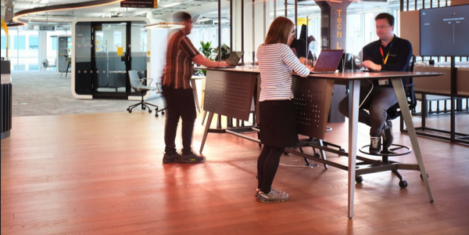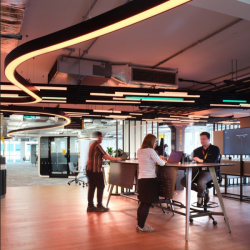April 21, 2022
Inflexible return to office strategies starting to damage workplace experience
 Future Forum, a consortium launched by Slack with Boston Consulting Group, MillerKnoll and MLT to “help companies reimagine work in the new digital-first workplace”, has released the latest findings from its global Pulse study, which shows that employee experience scores are plummeting for knowledge workers who have been asked to return to the office full-time and for those who do not have the flexibility to set their own work schedules. More than a third of knowledge workers (34 percent) are now working from the office five days a week, the greatest share since Future Forum began surveying in June 2020. With this shift, employee sentiment has dropped to near-record lows, including 28 percent worse scores on work-related stress and anxiety and 17 percent worse scores on work-life balance (compared to last quarter). (more…)
Future Forum, a consortium launched by Slack with Boston Consulting Group, MillerKnoll and MLT to “help companies reimagine work in the new digital-first workplace”, has released the latest findings from its global Pulse study, which shows that employee experience scores are plummeting for knowledge workers who have been asked to return to the office full-time and for those who do not have the flexibility to set their own work schedules. More than a third of knowledge workers (34 percent) are now working from the office five days a week, the greatest share since Future Forum began surveying in June 2020. With this shift, employee sentiment has dropped to near-record lows, including 28 percent worse scores on work-related stress and anxiety and 17 percent worse scores on work-life balance (compared to last quarter). (more…)

























 The first Omnirama event on the 23rd of March launched the series exploring different factors challenging the world of work in a time of prevailing uncertainty. Underlying Ominirama’s raison d’etre is that recent events have turned the status quo on its head with some major structural and systemic changes taking place. Nobody seems to have any clear idea of how to deal with this enormous transformation in the ways we work All the playbooks and all the guidance that we have all relied upon for so many years have now gone out the window.
The first Omnirama event on the 23rd of March launched the series exploring different factors challenging the world of work in a time of prevailing uncertainty. Underlying Ominirama’s raison d’etre is that recent events have turned the status quo on its head with some major structural and systemic changes taking place. Nobody seems to have any clear idea of how to deal with this enormous transformation in the ways we work All the playbooks and all the guidance that we have all relied upon for so many years have now gone out the window. 








April 13, 2022
Experimentation is the name of the game
by Eugenia Anastassiou • Comment, Facilities management, Flexible working, Workplace design